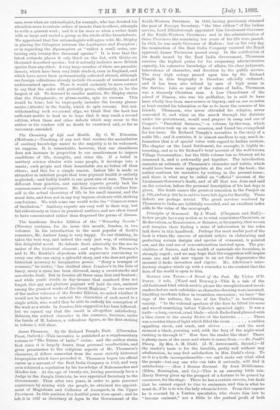James Thomason. By Sir Richard Temple, Bart. (Clarendon Press, Oxford.)—This
narrative is published as a supplementary volume to "The Rulers of India" series ; and the author states that since it is largely drawn from personal recollections, and gives prominence to the religious aspects of Mr. Thomason's character, it differs somewhat from the more strictly historical biographies which have preceded it, Thomason began his official career as a servant of the East India Company in 1822, and very soon achieved a reputation by his knowledge of Mahommedan and Hindoo law. At the age of twenty-six, having previously been a Judge in the Jungle Districts, he was appointed Secretary to the Government. Then after two years, in order to gain personal experience by mixing with the people, he obtained the appoint- ment of Magistrate and Collector of Azamgarh, in the Upper Provinces. In this position five fruitful years were spent ; and he left it in 1837 as Secretary at Agra to the Government of the North-Western Provinces. In 1843, having previously obtained the post of Foreign Secretary, "the blue ribbon" of the Indian service, Lord Ellenborough appointed him Lieutenant-Governer of the North-Western Provinces ; and in the administration of these Provinces the remaining ten years of his life were passed. In 1853, he was made Governor of Madras ; but on the very day the nomination of the East India Company received the Royal approval, James Thomason passed away. In the notification of his death issued by the East India Government, Thomason receives the highest praise for his surpassing administrative capacity, his extensive knowledge of affairs, his clear judgment, benevelence of character, and devotion to the public service. The very high eulogy passed upon him by Sir Richard Temple in this biography is therefore officially endorsed ; and it has been also echoed by men of high name in the Service. Like so many of the rulers of India, Thomason was a sincerely Christian man. A. Low Churchman of the school of Simeon, who was his godfather, he is said to have been wholly free from narrowness or bigotry, and on one occasion at least carried his toleration so far as to incur the censure of his friends. Thomason, who never obtruded his religion, never concealed it, and when on the march through the districts under his government, would read prayers in camp and one of Cooper's "Parochial Sermons,"—a volume, by-the-way, which Jane Austen took up on one occasion, and found too evangelical for her taste. Sir Richard Temple's narrative is the story of a noble life ; and it contains, it is almost needless to say, much in- formation that is of special value with regard to Indian matters. The chapter on the Land Settlement, for example, is highly in- teresting, and so is Sir Richard's brief account of the well-known Village Communities; but the little volume has no literary art to. commend it, and is awkwardly put together. The introduction contains an estimate of Thomason's character and habits, which would have been more appropriate at the end of the book ; the author confuses his narrative by writing in the present tense; and there is what may be called an "official" account of the Lieutenant-Governor's death, and of all that was done and said on the occasion, before the personal description of his last days is given. His death causes the greatest sensation in the Punjab on p. 196, and on p. 201 he is said to have left Agra for Bareilly. These defects are perhaps trivial. The great services rendered by Thomason to India are faithfully recorded, and an excellent index adds to the value of the monograph.










































 Previous page
Previous page